Your Cart is Empty
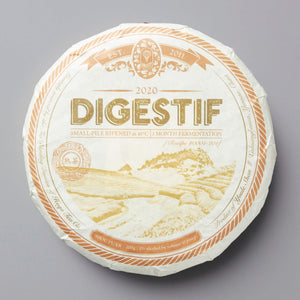
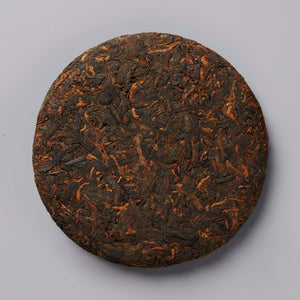
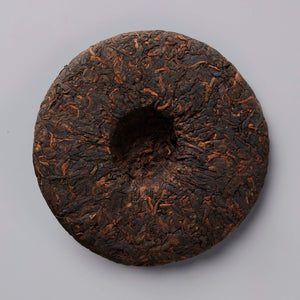
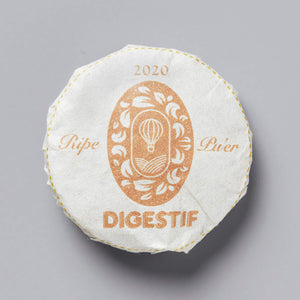
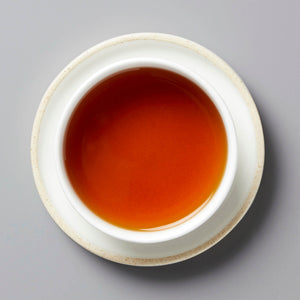
Sold out
2020 DIGESTIF | shou pu'er
$2.60 - $42.00
DIGESTIFis a shou (“ripe”) pu’er tea from Youle shan (shan = mountain), Xishuangbanna, Yunnan province, China, pressed in spring 2022 from material harvested and fermented in spring 2020. Produced with material normally destined for sheng pu’er (i.e. quality, whole-leaf material rich with buds), this shou was first processed to sheng: hand-plucked at a 1:3 (1 bud : 3 leaves) standard, sun-withered, stir-fried in large woks to partially fix (an important phase that separates it from green tea, where tea is fully fixed), sun-dried, and then fermented in small batches of approximately 10 kg. The fermentation process for shou is relatively simple, but requires an artisan’s eye to execute well, particularly in small batches like these where the details count. The tea is piled into mounds, wet thoroughly, allowed to ferment (or “cook” / “ripen”) for 7 days, turned and tossed with pitchforks, then re-wet and ripened again each week over 5-6 weeks. Then the tea was spread over mats, dried, and sorted before resting for 2 years and, finally, pressed into these cakes. Sounds like a lot, and it is—shou pu’er, so often considered a “lesser” tea to which undesirable material is relegated, is both a challenging artform to perfect and a financial risk for producers to use high quality leaf for. Our Xishuangbanna producer, Xiaohui, exclusively sources leaf from quality gardens for his teas, incentivizing a very careful production.
The raw material for DIGESTIF comes from trees aged 90-150 years on Youle Shan, one of the 6 “old” tea mountains east of the Lancang river in Xishaungbanna. Known for spicy-sweet and herbaceous pu’er tea, material from this mountain is well-suited to shou, ideally producing rich notes of camphor, menthol, spice, wood, and herbs as the tea ages. We didn’t taste this shou fresh, but chose our producer’s favorite finished batch from a couple years prior and asked for a relaxed compression to maximize airflow, all for the express purpose of minimizing “wo dui”, or “wet piling”, a name for both the process of fermentation and a tasting quality that always exists on fresh productions of shou. Wo dui is often expressed as marine-like, moldy, or otherwise funky, and is generally a sign of very fresh (or poorly made) shou pu’er. These two years have all but eliminated the wo dui in DIGESTIF, leaving behind a pleasantly spiced, easy-drinking character that we're confident will only improve with time.
Critically, the compression on this tea is middle-low, meaning ambient microbes in the air can access the tea and further its development—2-3 years’ time should see DIGESTIF develop real richness and complexity. This shou comes at a competitive pricepoint and delivers on its promises: no pile scent, amaro-like character, plenty of sweetness, and rich, inky body. Shou is said to be good for digestion (unsubstantiated)—but we like it steeped strong after a meal. Steep small-format and be sure to rinse (wash with hot water and instantly pour off) for an experience that gives and gives, or grandpa for a solid 7-8 mugs' worth.
VINTAGE — SPRING '20 (pressed in spring '22)
STYLE — SHOU ("RIPE") PU'ER
CULTIVAR — HEIRLOOM DA YE ("BIG LEAF")
REGION — XISHUANGBANNA, YUNNAN, CHINA
LOCALE — YOULE SHAN
ELEVATION — 1300 METERS
PRODUCER — XIAOHUI QUAN
STEEPING PARAMETERS
(use freshly boiled spring water)
modern, large format
4 grams — 210°F (99°C) — 1 minute
traditional, small format
7 grams — 210°F (99°C) — 10 seconds
(1-2 rinses recommended)
(1-2 rinses recommended)
+ 15-20 seconds each additional steep





